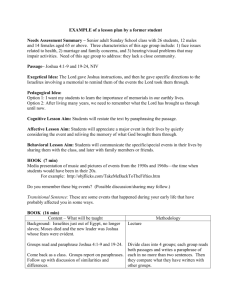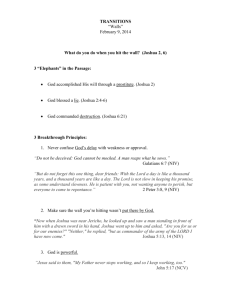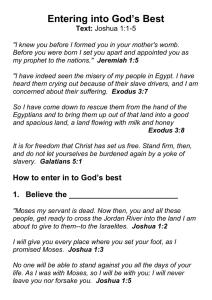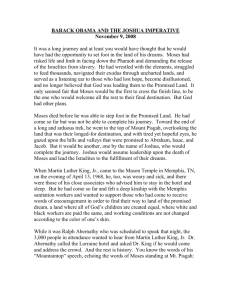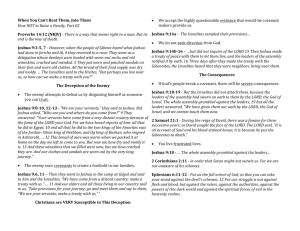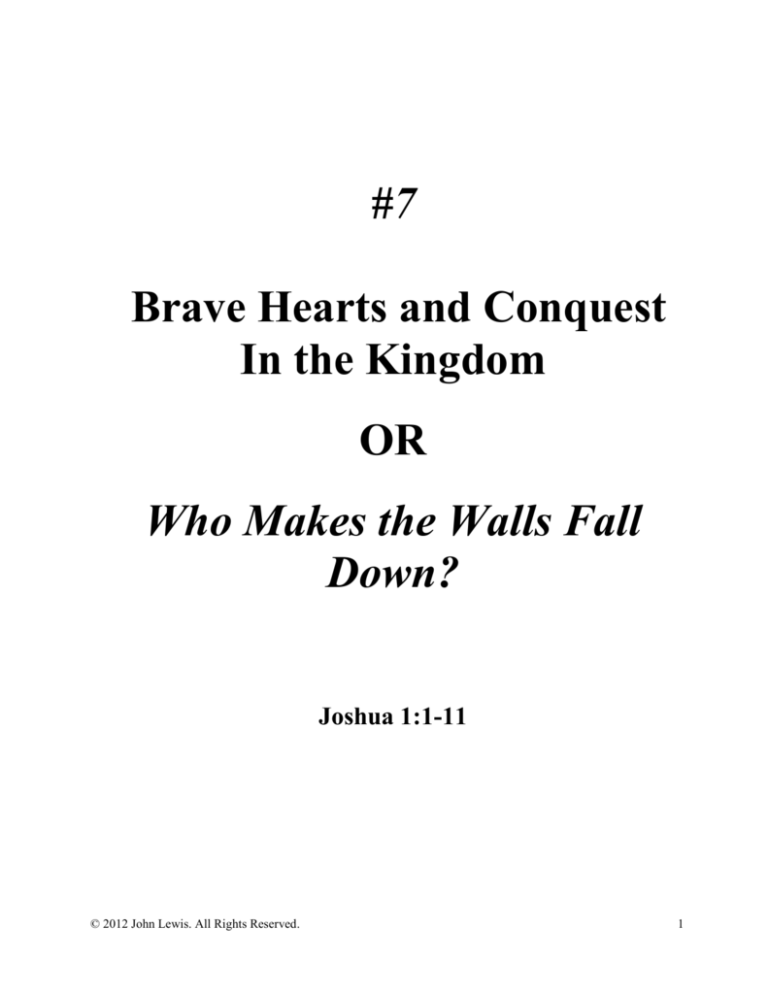
#7
Brave Hearts and Conquest
In the Kingdom
OR
Who Makes the Walls Fall
Down?
Joshua 1:1-11
© 2012 John Lewis. All Rights Reserved.
1
#7:
Brave Hearts and Conquest
In the Kingdom
INTRODUCTION
Brief Overview of Today’s Story: After Moses dies, God commissions their new leader, Joshua, promising
to deliver His people from their enemies and lead them to take possession of the Promised Land, giving
Joshua important promises to cling to, commands to follow, and blessings to enjoy.
Summary Verse:
“I hereby command you:
Be strong and courageous;
Do not be frightened or dismayed,
for the Lord your God
is with you wherever you go.”
Joshua 1:9
Introduction to Today’s Story and Themes:
Remember Joseph? He dreamed as a young boy of being exalted over his brothers into a place of
privilege. After thirteen years of “wilderness training,” having been rejected by his family, having been raised as
a foreigner in an Egyptian's house, and having been forgotten in Pharaoh’s prison, Joseph’s dreams finally came
true. Exalted in Pharaoh’s court, his brothers did come and bow down to him. But not before Joseph had bowed
his own knee. God used humiliation to give Joseph the perspective that God’s favor had permeated his entire life,
even in the midst of his most terrible moments of despair and suffering. These lessons of humility positioned
Joseph to be an administrator of compassion and justice in overseeing Egypt’s bounty during the famine.
Joseph’s story is also in a very real sense, Israel’s story. The dream of God’s presence at Mt. Sinai
pulsated through a generation of wandering and wondering. “Why are we stuck in this wilderness? Why can’t we
go back? Why did we ever get hoodwinked into leaving?”
Yet all along, God’s presence remained near His people just as He had been present with Joseph. During
this time, God used Moses to help Israel know how to be faithful in their new covenant. Instructions were given
on how to worship, celebrate and give thanks, and how to find forgiveness with God after sin and wandering.
Moses was also mentoring Joshua, helping him shape his vision and modeling for him how to discipline
grumblers and find refuge in the living presence of God. All these combined in an unlikely way to set the stage for
Israel’s confident entrance into the Promised Land; they arrived with a heartfelt awareness that it was God’s
provision that was making the impossible, possible. In the end, Joseph’s dreams in a sense came true for them as
well: their Canaanite enemies bowed down to them in battle after battle.
After finishing his leadership training from Moses, his mentor, Joshua very capably led Israel’s army into
victory after victory over the Canaanites. But like Joseph, he could never forget the lesson of his forty-year boot
camp and the first miracle, the “tithe” of Jericho: “the battle belongs to the Lord.” His mentor Moses had taught
him to sing, “How could one chase a thousand and two put 10,000 to flight unless their Rock had sold them and
the Lord had given them up?” These lessons served as a foundation for the courage, and perspective on success
that motivated and permeated Joshua’s entire life.
"Cowardly men and women, overwhelmed by the uncertainties of life, lose the will to live. We must
constantly build walls of courage to hold back the flood of fear."
Rev. Martin Luther King, Jr.
© 2012 John Lewis. All Rights Reserved
2
SETTING UP THE STORY: An Overview of JOSHUA
Author: Joshua was a leader known for his trust in God. He walked alongside Moses through the parting of
the Red Sea and was anointed as the one who would take the Israelites to the Promise Land upon Moses'
death. He also displayed intelligence in battle plans and politics.
Setting: The land of Canaan, the Promised Land.
Summary of the Book and its Purpose:
The Book of Joshua is the story of how the Israelites, under Joshua's leadership and God's own
mighty help, conquered and settled in the Promised Land. The Lord's triumph over the Canaanites testified to
the world that the God of Israel is the one true and living God, who rightly claimed worldwide allegiance.
The first half of Joshua recounts the Israelites beginning to move into the Promised Land with
Joshua and Caleb. With God as their true commander, military victories leads them to conquer much of the
land. Though the Lord commanded them to eliminate all of the Canaanites, the Israelites compromised and
let some of them stay and live in slavery. (Cf., Ju. 1) The second half of the book details the distribution of
land among the Jewish tribes and the final speech of Joshua.
Chapter by chapter overview
Joshua was called by God to be "strong and courageous” and lead the Israelites into the Promised
Land, which had already been given to them. Joshua’s part was to meditate on and obey all the law. (1)
The first action that Joshua initiated as a leader was to send spies into Jericho and gather intel on the
enemies. Two spies entered Jericho and stayed with Rahab, a prostitute. Rahab saved the men by lying to the
king, saying that the men had left the city when in reality she was hiding them on her roof. Because of this,
Rahab and her family were spared when Jericho was destroyed. (2)
The Israelites next challenge was to cross the Jordan River. Just like He had at the Red Sea forty
years earlier, God dried up the river so the Israelites could cross it with the Ark of the Covenant. In
remembrance of God's great act, each leader of the twelve tribes chose a stone to build a memorial so their
children would know of God's saving power. (3, 4)
The Israelites had to conquer the Jericho fortress in order to get access to the rest of Promised Land.
The angel in charge of the heavenly hosts revealed himself to Joshua and reminded the human leader of who
was truly the leader. With this fresh assurance, Joshua followed God's commands by marching around the
city six times, playing trumpets, and shouting. The walls of Jericho crumbled and the Israelites took over the
city. Because Jericho was first among the cities conquered, it is like a tithe, dedicated and set aside. Except
for Rahab and her family, and for gold and silver for the Lord's treasury, nothing was spared. The entire city
went up in flames as a "burnt offering." (5, 6)
The people were commanded not to take anything from the city for themselves. Achan took from
God's spoils at Jericho and hid the goods from his own people - and God. After Israel is routed at Ai, an
investigation is conducted and Achan admits that he was the man that violated God’s command. He and his
family were stoned by the people and served as an example of how even one individual's sin can infect the
entire community. God needed to dramatically remind them of His holiness and their call to absolute
obedience. (7)
With God's protection, Joshua and the Israelites destroyed Ai and entered the Promise Land (8).
Joshua built an altar at Shechem to represent a renewal of the covenant at Sinai. The people presented burnt
offerings and Joshua copied the law of Moses onto new stones (8). The lands were divided up according to
tribes. (13-19) As in the book of Numbers, cities of refuge were established and towns for the Levites were
designated. (20-21). Joshua sent out the tribes into their inherited land but soon afterwards a civil war almost
started between the tribes on each side of the Jordan River (22).
At the end of the book, Joshua gave a farewell speech in his old age to the 12 tribes. He instructs
them to follow Yahweh, and warns them not to forget His faithfulness.. (23) In remembrance of God's
faithfulness, the people pledged their loyalty to Yahweh in a second renewal of the covenant at Shechem.
They promised to throw away their foreign gods and idols and remain loyal to God. Joshua recorded laws
and decrees into the Book of the Law of God. The people buried Joshua in the land of his inheritance. (24)
© 2012 John Lewis. All Rights Reserved
3
LOOKING AT THE STORY Passage & Words: Joshua 1:1-11
1
After the death of Moses the servant of the LORD, the LORD spoke to Joshua son of Nun,
Moses' assistant, saying, 2"My servant Moses is dead. Now proceed to cross the Jordan, you and
all this people, into the land that I am giving to them, to the Israelites.3Every place that the sole of
your foot will tread upon I have given to you, as I promised to Moses. 4From the wilderness and
the Lebanon as far as the great river, the river Euphrates, all the land of the Hittites, to the Great
Sea in the west shall be your territory. 5No one shall be able to stand against you all the days of
your life. As I was with Moses, so I will be with you; I will not fail you or forsake you. 6Be strong
and courageous; for you shall put this people in possession of the land that I swore to their
ancestors to give them.7Only be strong and very courageous, being careful to act in accordance
with all the law that my servant Moses commanded you; do not turn from it to the right hand or to
the left, so that you may be successful wherever you go. 8This book of the law shall not depart out
of your mouth; you shall meditate on it day and night, so that you may be careful to act in
accordance with all that is written in it. For then you shall make your way prosperous, and then
you shall be successful. 9I hereby command you: Be strong and courageous; do not be frightened
or dismayed, for the LORD your God is with you wherever you go.”
10
Then Joshua commanded
the officers of the people, 11“Pass through the camp, and command the people: ‘Prepare your
provisions; for in three days you are to cross over the Jordan, to go in to take possession of the
land that the LORD your God gives you to possess.’”
“It is pardonable to be defeated but never to be surprised.”
Frederick the Great (1712 – 1786)
© 2012 John Lewis. All Rights Reserved
4
LOOKING AT THE STORY Outline
Write one or more important observations you want to remember under each section below.
A.1:1-2) “Cross the Jordan/Receive the land:” God speaking to Joshua, new leader to the people
B.1:3-5) Promises (All places, All times) list them below:
V. 3:
V. 4:
V. 5:
B.1: 6-9) Commands and promised blessings (All places, All times) list them below:
Commands:
Blessings/Results/Reasons to obey these commands:
A.1:10 -11) “Cross the Jordan/Take the land:” Joshua speaking to officers to people
1. Why might it be significant that God’s promises come before His commandments to Joshua?
2. How would you summarize the flow of this commissioning of Joshua (v. 3-9)?
3. Which part seems to be the most important or the climax?
© 2012 John Lewis. All Rights Reserved
5
LISTENING TO THE STORY:
The following few pages are to be used during the gathering
“Jesus, our Word of Life, use the Feelings, Actions, Thinking, and Speaking (“FATS”) of the story’s
characters to help us listen to this passage from the Bible with fresh ears. Open our hearts to authentically
explore the questions below, the lesson’s theme, and the implications for our own lives and to those we serve
in our community. Spirit, speak to both our perceptions and misperceptions, to life as it is and as it could be
here on earth."
1. THE GOD QUESTION: Use single words or short phrases to describe the attributes of God which
were displayed as He related to the characters of this story.
Which ONE is particularly relevant to your life, to those you serve, or to the last, least, or lost?
2. KINGDOM RELATIONSHIPS: Share single words or short phrases to summarize some important
ways that the story’s characters related, or were supposed to relate to:
God:
Other people in the story:
The created world:
Which ONE is particularly relevant to your life, to those you serve, or to the last, least, or lost?
3. THE BIGGER STORY FIT
A parallel passage or story:
Name one way this parallel passage is similar, and one way it is different from today’s story, and
consider what that might add to the nature of what we have learned today. (See Q#1-2 above.)
4. SUMMARIZE briefly some of the highlights of what we learned and a way God is speaking to you
in your own story:
© 2012 John Lewis. All Rights Reserved
6
LEANING INTO KINGDOM THEMES
POSSIBLE THEMES:
1. COURAGE: Not the absence of fear, but the overriding conviction of something greater that leads to
action despite fear’s presence.
2. Success: Whose standard do we use to evaluate how we have measured up to our universal longing for
meaning and significance.
3. Mentoring: A potent catalyst for personal transformation is a faithful guide who walks alongside us.
RELATED PRACTICES:
Meditation: To internally “chew on and eat” God’s word is crucial for faith and deeper prayer, but easy to
overlook in today’s often non reflective world. If we read or study without it, we will be famished in heart.
Mentoring and Coaching: Mentoring focuses a little more on the mentor’s role of leading or passing on
wisdom; coaching focuses more on helping the person get to where they already want to go.
MORE ON COURAGE
1. A REAL LIFE EXERCISE:
Introduction - The way things really are: As a group or otherwise, pick a person you serve OR a
vulnerable population in your community that regularly requires and/or demonstrates
COURAGE.
Describe several real life hardships they face that require courage and risk taking to overcome.
Brainstorm a few individual, cultural and institutional factors that help explain how these
hardships came into being.
How do they already show courage? What can their situation and experience teach us?
What does their experience of overcoming fear have to teach us about living with courage?
Implications - The way things could become: Considering what we have learned and
experienced in today’s story, choose, do, or delegate from the following:
Imagine: If God were in charge and if we His people were part of the solution, how
could we help deal with their fears and help provide courage?
What outcomes do you imagine if His presence was more felt and available?
What is one implication and next step that is confronting you or your team as you
consider how to join God’s efforts to serve and impact this population?
What resources would be available to you to carry this out, both from within your
team and from those being served?
2. OUR CULTURE AND MY SERVING CONTEXT
What is one example from our country where courage is being demonstrated by a group of unlikely
people or by an unlikely leader? What seems to be the secret of their courage?
What are 1-2 situations in your life, in the church, in your ministry, in your city and in our world that
demand your courage today?
3. LIFE STORY QUESTIONS (Past and Present)
What heroes or mentors in your own life’s story demonstrated courage for you growing up?
Two commands were given to Joshua to help him cultivate the sense of God’s presence and courage:
obey God in all things, and to meditate on His word at all times. How do these 2 commands relate to
you and your journey with courage?
© 2012 John Lewis. All Rights Reserved
7
LIVING INTO THE STORY: Pick and volunteer now from below for after the gathering
Note: Be prepared to briefly share in the next class about what you chose to do.
1: REFLECT – in writing (3 parts, and can begin in the class experience)
AUDIENCE SELECTION: Identify and then write the name of the person you will write your
reflection to.
WRITING: Identify and then elaborate on one idea, image, theme or character that was particularly
relevant to you in this story/lesson. Write freely and without self critique. Write in a way that is
meaningful to you and also understandable to your chosen audience. (Additional resource: Linking
God’s Story to Mine)
SHARING OPTIONS: Email to the class, share with your mentor, send to the letter’s recipient, or
to a friend.
2: READ – What others have said
GO TO THE WEBSITE: Explore the “Featured Readings” or other resources (articles, poems,
quotes, stories, etc.) available there. Recommended: Click HERE to read the selection from Theirs
is the Kingdom, by Robert Lupton, associated with this lesson.
FIND: Go online or to another source to find an, article, blog, or sermon video related to the story
or the theme. Consider sharing it with the class.
3: RESPOND – Put faith in action
OBEYING GOD’S VOICE: Trusting that God has spoken to your heart during this week’s lesson,
listen and then commit now to doing a specific action for a person(s) this coming week. Write down
the specifics: What, when, where, etc. (Resource: any part of this lesson and/or ideas from the
facilitator).
CREATE: Design a poem, song, artwork, photo, talk outline, small group discussion, or a ministry
strategy that connects to or flows out of today’s lesson, theme or case study, theme or lesson.
COMMUNITY ENGAGEMENT: Do a site visit and interview a leader whose circumstances and
response in the community required (or often requires) significant courage and risk taking. (e.g.
Police, firemen).
“Do not pray for easy lives; pray to be stronger people. Do not pray for tasks equal to your powers; pray for
powers equal to your tasks. Then the doing of your work shall be no miracle, but you shall be a miracle.”
Bishop Phillips Brooks
© 2012 John Lewis. All Rights Reserved
8

